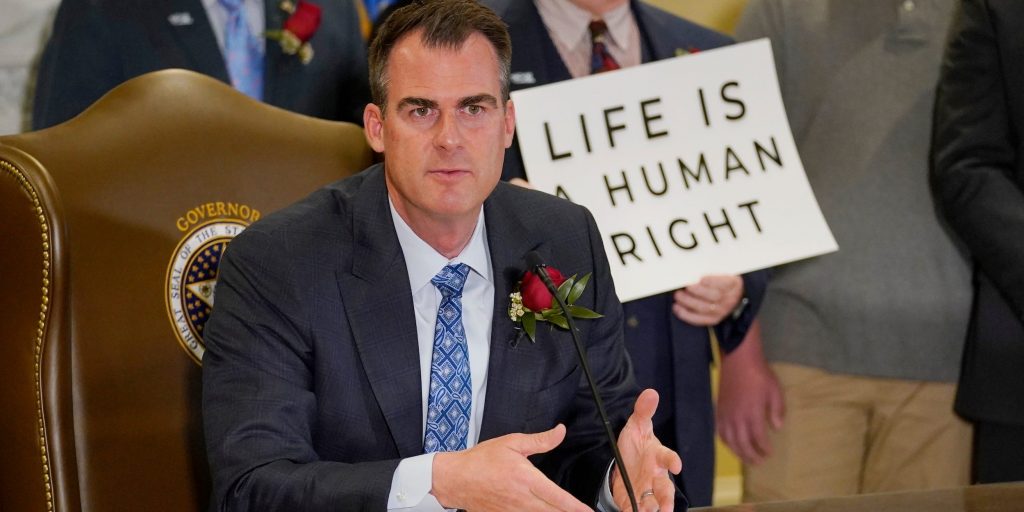- Oklahoma is one step closer to having one of the most anti-abortion laws in the nation.
- The state's legislature passed a bill banning almost all abortions from the point of "fertilization."
- Gov. Kevin Stitt, a Republican, is expected to sign the latest legislation into law.
The Oklahoma legislature on Thursday based a near-complete ban on abortions after "fertilization," a move that shows just how far Republican-controlled states are will to go to ban abortions as they expect Roe v. Wade to be overturned by the Supreme Court.
The legislation, HB 4327, is modeled after Texas' controversial anti-abortion law that is based on civil rather than criminal enforcement of a ban on abortion. But Oklahoma's bill goes further than Texas by banning abortion from the moment of "fertilization" while Texas' ban begins at roughly six weeks of pregnancy.
Oklahoma Gov. Kevin Stitt, a Republican, has repeatedly pushed for his state to be the most anti-abortion in the country. He is expected to sign HB 4327 into law. According to The Oklahoman, only two Republicans broke ranks on the final vote.
Over the weekend, Stitt defended a move away from excepting abortions in the case of rape, incest, or the health of the pregnant person. Every Republican president from Ronald Reagan, including Donald Trump, supported such exceptions.
"I have daughters, I can't even imagine what it would be like in that hardship," Stitt told Shannon Bream on Fox News Sunday. "That is a human being inside the womb, and we're gonna do everything we can to protect life and love both the mother and the child. And we don't think killing one to protect another is the right thing to do either."
HB 4327 does provide exceptions in the case of rape or incest if the alleged crime is reported to authorities. It also contains specific exceptions for the use of Plan B or similar so-called "morning-after" pills. The bill also does not include the removal of ectopic pregnancy under its definition of an abortion.
Otherwise, the legislation largely mirrors Texas' law. That means that private citizens could bring civil suits against anyone who "aids or abets" an abortion, which would include both physicians as well as anyone who pays for an abortion. Also, like Texas' law, the bill would bar insurance providers from covering any part of the cost of an abortion.
Chief Justice John Roberts previously slammed Texas' law, writing last year that decision to delegate enforcement to private individuals was part of "an array of stratagems designed to shield its unconstitutional law from judicial review." But Roberts' plea went unheeded. The court allowed Texas' law to go into effect while a legal challenge to it worked its way through federal courts.
Republican-controlled states have rushed to pass anti-abortion laws.
Their efforts have been buoyed by a leaked draft Supreme Court opinion. In the draft opinion published by Politico, Justice Samuel Alito writes for a majority of justices,gutting federal abortion rights by explicitly overturning Roe and Planned Parenthood v. Casey. A final ruling from that case, which is based on Mississippi's anti-abortion law that effectively bans most abortions at 15 weeks of pregnancy, is expected to be released later this summer. In the meantime, Roe and Casey remain in effect.
If the landmark decisions were struck down, states would have much more free rein to restrict or legalize abortion rights absent congressional action. Democrats in Congress have thus far failedto codify a federal abortion right into law.










